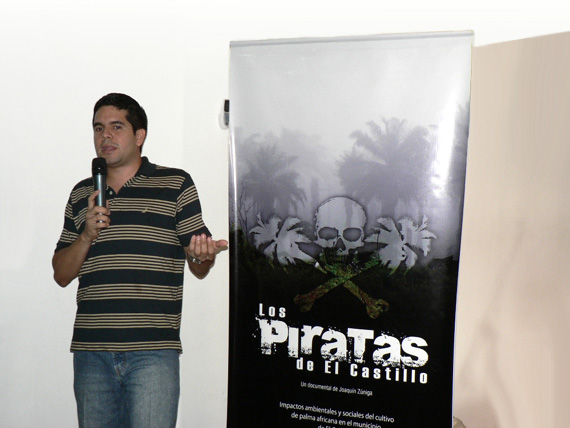|
The Nicaraguan
organizations Centro Humboldt, Fundación del Río and Fundación Luciérnaga
recently released their production “Pirates of El Castillo,” a revealing
documentary that describes the serious social and environmental impacts of
single-crop farming of African palm in the southern Nicaraguan municipality of
El Castillo.
African palm
farming in Nicaragua began in the 1980s, when over one thousand hectares
were planted with palm crops by cooperatives that sold their production to the
state.
With the
Sandinista defeat in the 1990 elections and the subsequent wave of neoliberal
policies, the African palm cooperatives in the municipality of El Castillo,
department of Río San Juan, were privatized and acquired by the company E.
Chamorro Industrial (Pellas Group), which later sold it to another
company, Palmares de El Castillo SA (PALCASA).
“The expansion
of African palm crops is severely undermining the area’s sustainable production
model, in particular organic cocoa bean crops,” Amaru Ruiz, a member of
Fundación del Río said.
“It’s causing
serious environmental damage and biodiversity loss, and local workers are being
brutally exploited in the plantations.”
In 2007,
PALCASA began expanding its crops in the municipality of El Castillo, one of
Nicaragua’s three biosphere reserves, affecting another eight
municipalities and the buffer zone of the Indio-Maíz Biological Reserve.
|
The same story everywhere
Exploitation, land concentration, pollution, biodiversity loss, and
food insecurity |
Through the
German Investment and Development Society (DEG) -a member of the German Development Bank (KFW)- the
company accessed significant financial aid that enabled it to expand its palm
crops to almost 6,000 hectares. But it has only conducted an environmental
impact study and obtained a permit to operate in 2,400 of those hectares.
According to Maura Madriz, water official at Centro Humboldt, the
worst effects of these crops are “critical biodiversity loss, deforestation, and
water pollution due to poor wastewater management and indiscriminate use of
toxic agrochemicals.”
“PALCASA applies Diuron, Paraquat, and Glyphosate,
and even Kasumin, which has been banned in the European Union,”
Madriz continued. “The workers have to spray large quantities of these
products without any kind of protection. This is causing great damage to their
health and to the aquifers.”
The Centro Humboldt water official also reported an alarming process of
land concentration and air pollution caused by the organic ash discharged by the
burning of palm waste for power generation.
From owners to farm hands
The documentary’s producer, Joaquín Zúniga, a member of Fundación
Luciérnaga, described the critical living conditions of the people in the
area.
“Using straw men, the company has accumulated vast expanses of land. The small
landholders have lost their land and are now farm hands working for PALCASA
under appalling conditions.”
“Most are outsourced temporary workers who are paid next to nothing, have no
social benefits and are denied the right to unionize. It was hard to find people
willing to talk to us, because everyone’s terrified that they’ll be fired,”
Zúniga explained.
The affected municipalities are already suffering food shortages and the
people’s food security is severely threatened. This situation is displacing
people across the border into neighboring Costa Rica or into other parts
of the country, and this is expanding the agricultural frontier.
In view of this situation, the Municipal Council of El Castillo issued an order
prohibiting any further expansion of the area covered by single crop farming, in
application of the precautionary principle.
It also demanded that PALCASA present the necessary documentation to
operate in the area. The company reacted by threatening to sue the municipal
government.
“The situation is alarming. Fundación del Río performed a thorough study
that clearly revealed that palm crops are not contributing in any way to the
area’s development.”
“What it is doing, instead, is causing great environmental, social, and economic
damage. We’re planning a national impact campaign to raise awareness on the
issue of African palm crops and what this company is doing,” Amaru Ruiz
concluded.

|